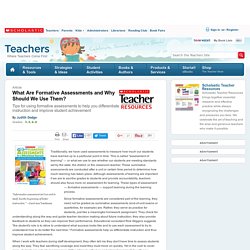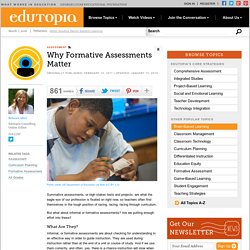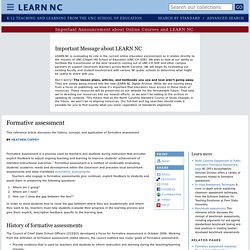

Blueprint for pre-assessment. Formative assessment - Dylan Wiliam - Video search - Journey To Excellence - Nightly. What Are Formative Assessments and Why Should We Use Them? "Informative assessment isn't an end in itself, but the beginning of better instruction.

" —Carol Ann Tomlinson Traditionally, we have used assessments to measure how much our students have learned up to a particular point in time. This is called "assessment of learning" — or what we use to see whether our students are meeting standards set by the state, the district, or the classroom teacher. These summative assessments are conducted after a unit or certain time period to determine how much learning has taken place. Although assessments of learning are important if we are to ascribe grades to students and provide accountability, teachers should also focus more on assessment for learning. Since formative assessments are considered part of the learning, they need not be graded as summative assessments (end-of-unit exams or quarterlies, for example) are. When I work with teachers during staff development, they often tell me they don't have time to assess students along the way. Exit Cards. Stiggins - Assessment Crisis: The absence of assessment for learning.
Why Formative Assessments Matter. Summative assessments, or high stakes tests and projects, are what the eagle eye of our profession is fixated on right now, so teachers often find themselves in the tough position of racing, racing, racing through curriculum.

But what about informal or formative assessments? Are we putting enough effort into these? What Are They? Informal, or formative assessments are about checking for understanding in an effective way in order to guide instruction. They are used during instruction rather than at the end of a unit or course of study. What this means is that if we are about getting to the end, we may lose our audience, the students. We are all guilty of this one -- the ultimate teacher copout: "Are there any questions, students? " Ever assign the big project, test, or report at the end of a unit and find yourself shocked with the results, and not in a good way? To Inform, Not Punish Believe me, I've been there: wanting to punish the lazy, the cocky, the nonchalant.
When and How? Exit Slips. From formative assessment to assessment for learning. Assessment for Learning. Assessment for Learning. Formativeassessment-technology - home. Why Formative Assessments Matter. Formative and Summative Assessment in the Classroom. Formative assessment. Formative assessment is a process used by teachers and students during instruction that provides explicit feedback to adjust ongoing teaching and learning to improve students’ achievement of intended instructional outcomes.

Formative assessment is a method of continually evaluating students’ academic needs and development within the classroom and precedes local benchmark assessments and state-mandated summative assessments. Teachers who engage in formative assessments give continual, explicit feedback to students and assist them in answering the following questions: Where am I going? Where am I now? How can I close the gap between the two? In order to show students how to close the gap between where they are academically and where they want to be, teachers must help students evaluate their progress in the learning process and give them explicit, descriptive feedback specific to the learning task.
History of formative assessments Learning Progressions Learning Goals and Criteria for Success. Tools For Teachers and Students.